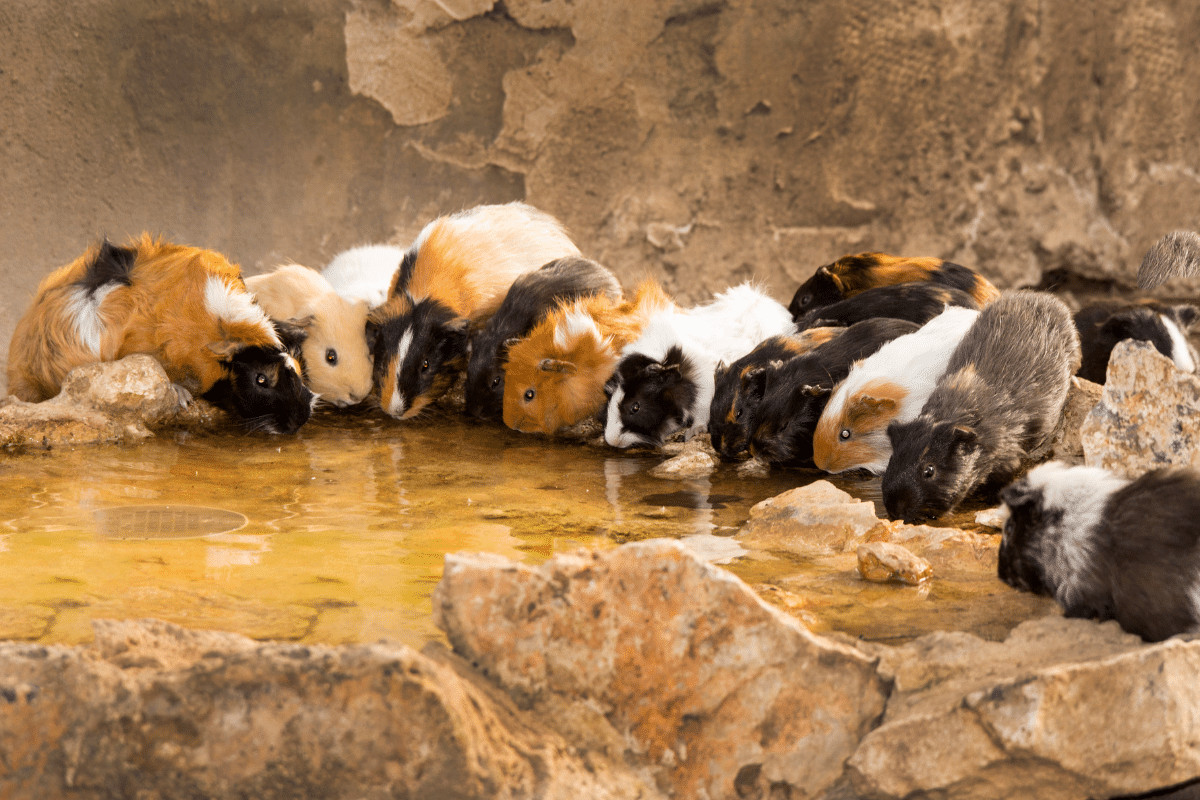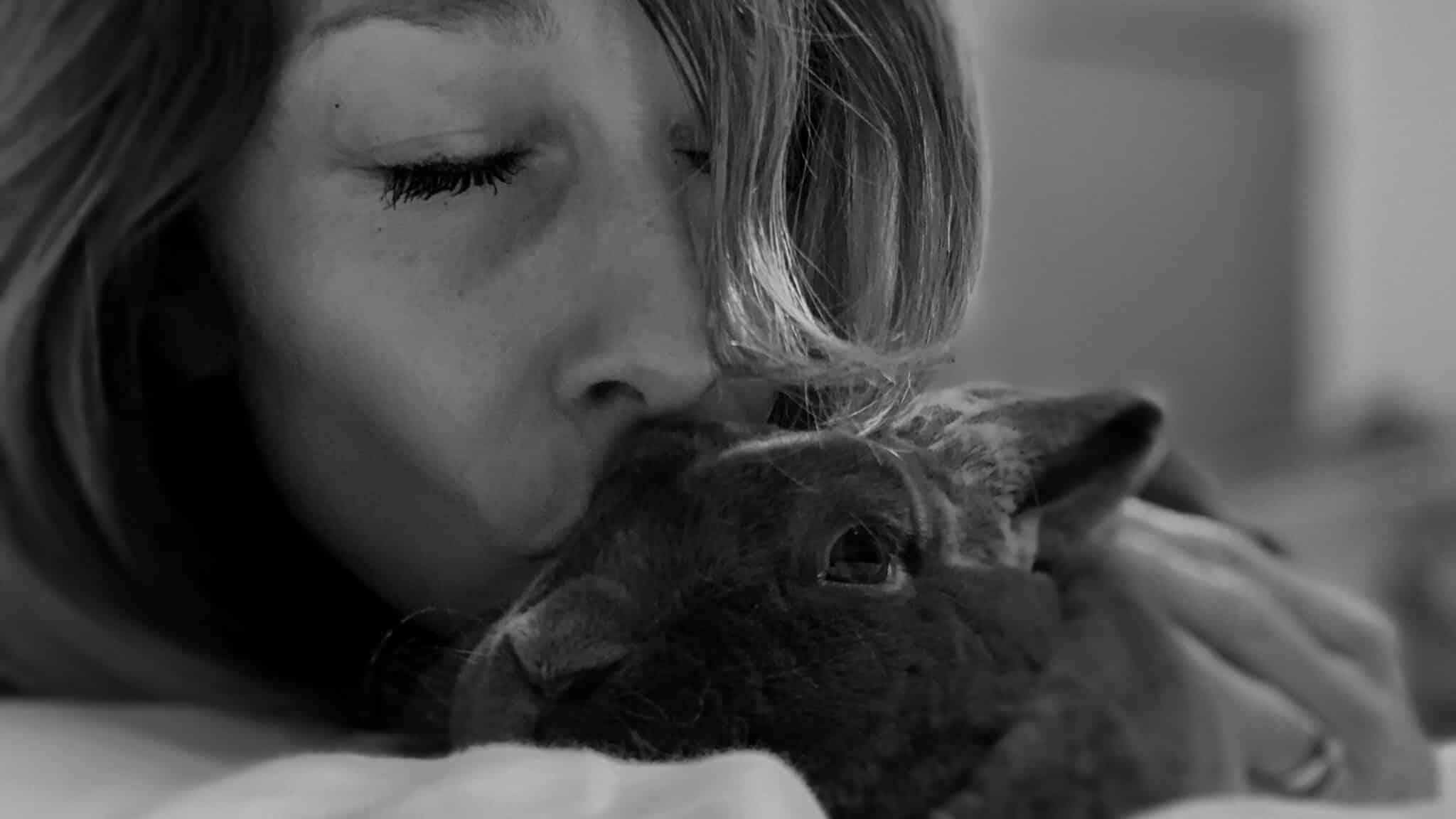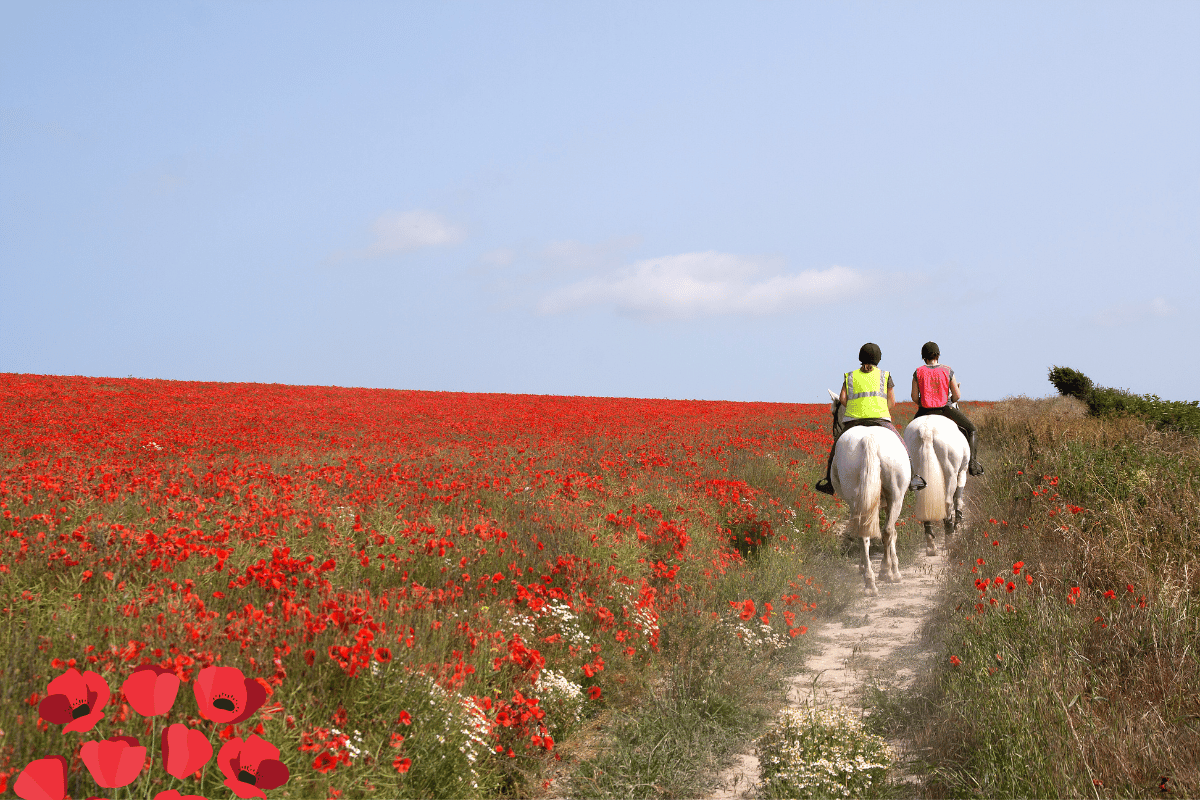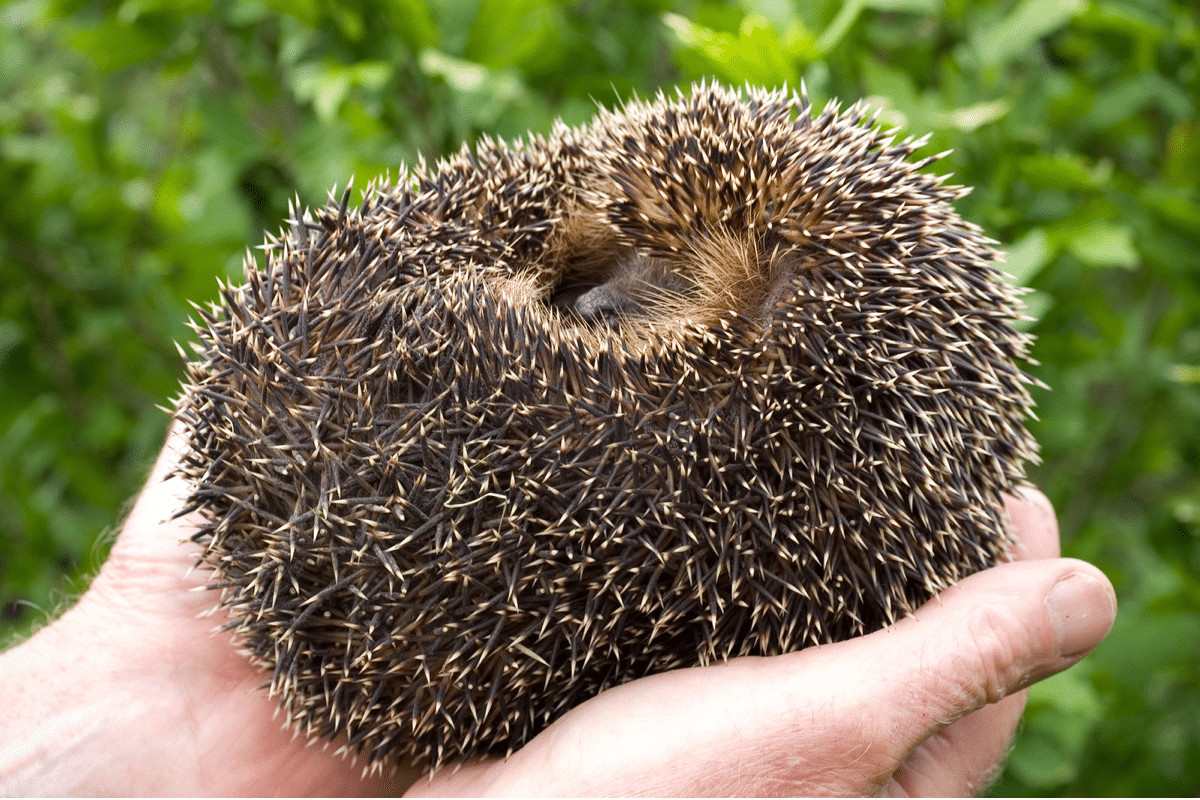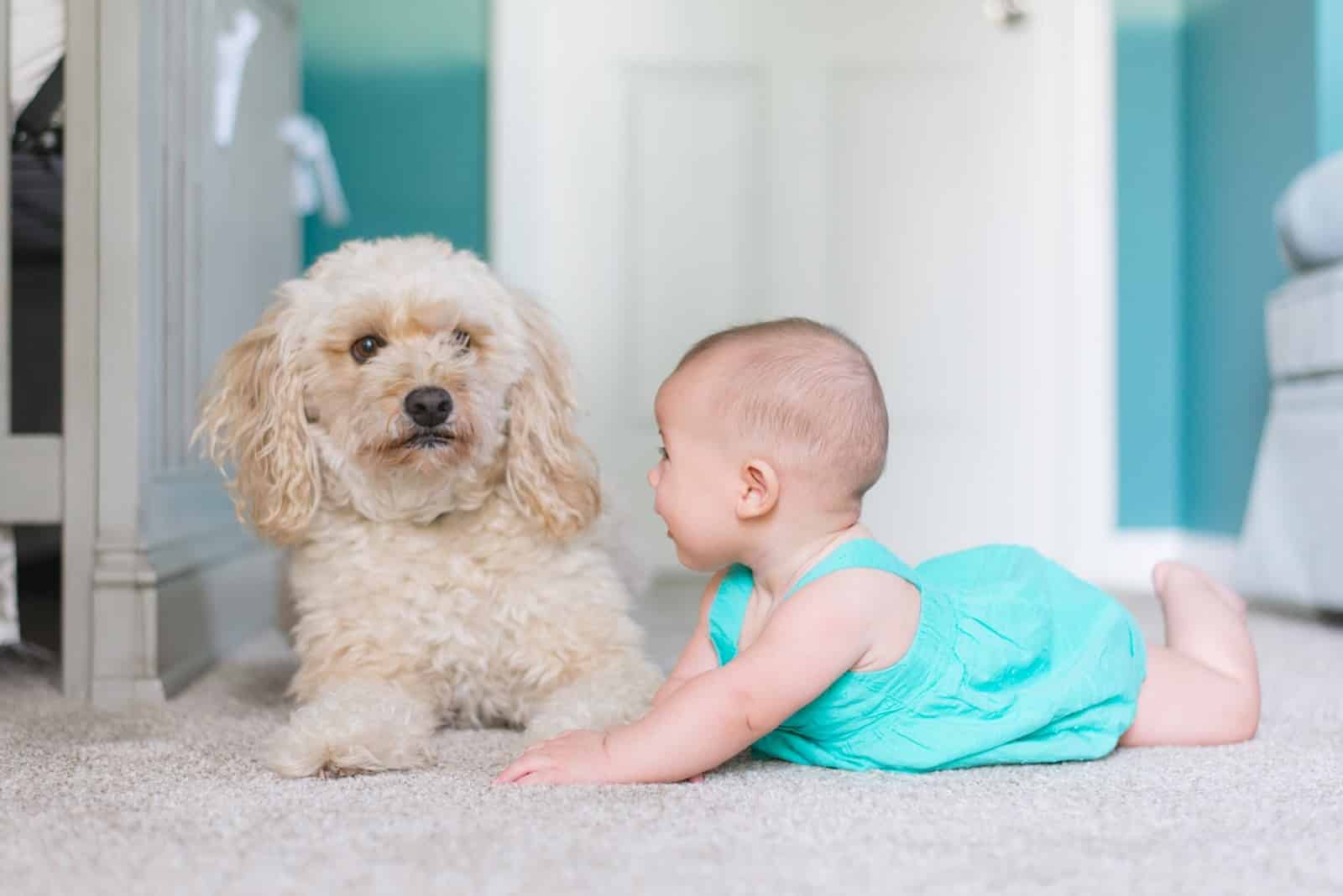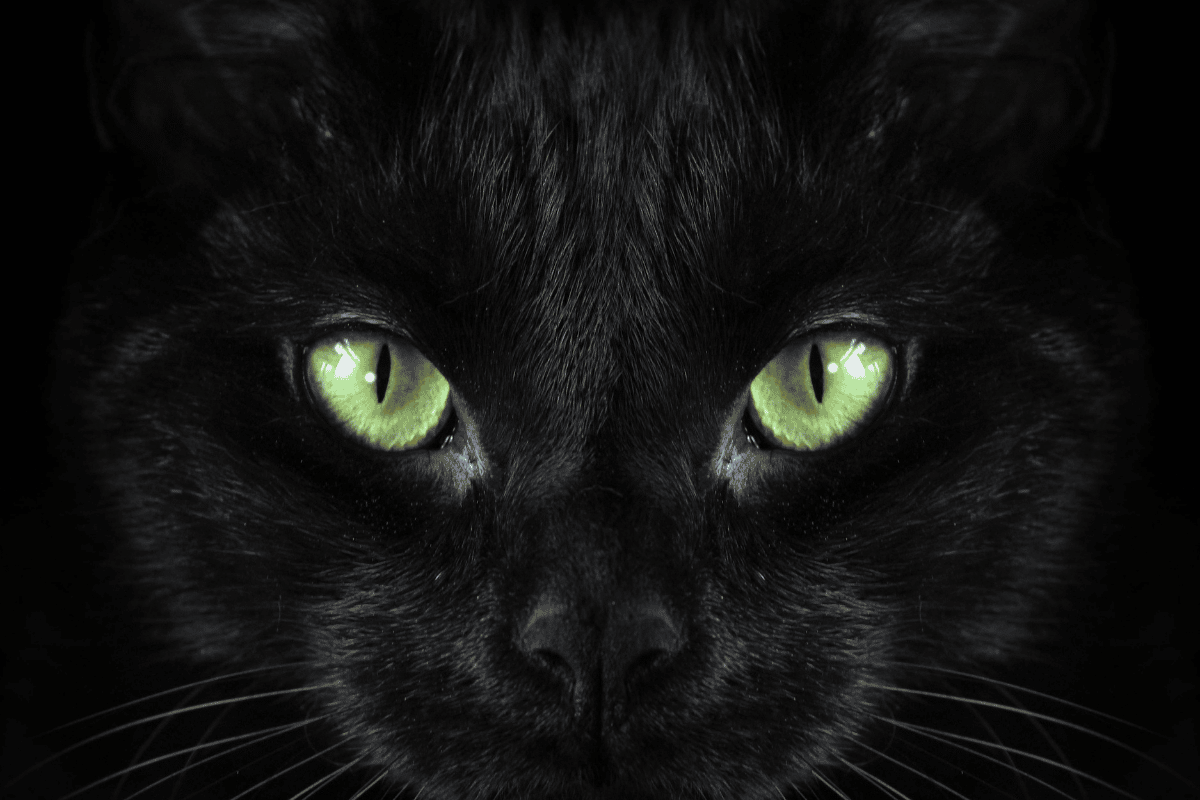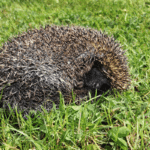Can guinea pigs swim? Yes, if they have to. But do they enjoy it? Absolutely not! Swimming is unnatural, stressful and potentially dangerous for your cavy. Let’s look at why.
Contrary to the hundreds of videos on YouTube clips of guinea pigs swimming, we can unequivocally answer on behalf of our cavy companions that swimming isn’t something guinea pigs enjoy doing and willingly participate in.
This picture, as sweet as it looks, doesn’t tell the real story about guinea pigs and swimming. The video clip below is also somewhat deceiving…
Did you know? Capybaras are distant cousins to guinea pigs and rock cavies and are in fact semi-aquatic.
Do Guinea Pigs Swim In The Wild?
Swimming is not what guinea pigs do in their natural habitat. In fact, they live as far away from water as possible in underground burrows for safety.
If they do find themselves in an unfortunate situation, under threat, as a prey animal, they’ll make their way across a small body of water (under duress) to escape death.
However, this doesn’t happen often and it’s definitely not an activity they do for fun.
What Are The Dangers Of Swimming For Guinea Pigs?
Guinea pigs aren’t natural swimmers and don’t like being in the water. Physiologically they’re not built for it, and being forced to swim for a human’s entertainment puts their bodies under a lot of stress, and exposes them to all sorts of illnesses.
Let’s take a look at all the other dangers associated with swimming for guinea pigs.
Pneumonia
Every responsible guinea pig owner knows that cavies can’t control their own body temperatures very well. And being in cold water for any period puts them at serious risk of developing pneumonia.
Even after a warm bath, piggies need to be dried off quickly, and thoroughly, to prevent them from getting this life-threatening condition.
Ear infections
Guinea pigs are prone to many illnesses and health issues including bumblefoot, upper respiratory infections, abscesses, flystrike and more.
An ear infection, on the other hand, is very rare for these pocket pets UNTIL they get water in their ears from swimming.
If left untreated, the infection can pass from the middle ear into the inner ear, affecting your piggy’s nervous system. This can lead to death.
Stress
As cute and cuddly as your cavy is, it’s always important to remember it’s a prey animal. What this means is that it’s always on high alert and forcing it into situations that make it feel threatened or scared causes its stress levels to soar.
Being in a stressed-out state for too long can cause long-term health conditions for your piggy.
There’s also a very good chance your guinea pig will become fearful of you, which is the last thing any pigg parent wants.
Exhaustion
As already mentioned, guinea pigs aren’t built for swimming. Their little arms and legs do not have the muscles to paddle around in the water for any amount of time. Cavies simply don’t have the stamina for this type of exercise and can drown.
Depression
In the same way, swimming can lead to stress in guinea pigs, it can also cause depression and lead to other more serious health issues.
Skin issues
Cavies have thick coats and getting wet washes off their natural oils, which can lead to skin irritations. Also if the swimming water has any chlorine or other chemicals in it and your piggy has a cut on its skin, it can cause an infection, which can become life-threatening.
Forcing a guinea pig to do something it doesn’t enjoy simply for your pleasure is nothing short of cruel. If you still think it’s a good idea for your piggy to swim, we think you should watch this video…
What About Bathing My Guinea Pig?
If your piggy gets pongy once in a while, you may want to give it a bath. We recommend doing this only once a month during the warmer months and maybe every two to three months when it’s colder.
But there are a lot of do’s and don’ts when it comes to washing your guinea pig. Take a look at this article to keep your piggy safe in and around water.

Frequently Asked Questions About Guinea Pigs And Swimming
We’ve rounded up the most frequently asked questions about guinea pigs swimming in this section. Knowledge, in our opinion, is power, and when you know better, you’re able to do better.
Let’s start with the most popular question first.
Is it okay to teach my guinea pig to swim in a bath?
To reiterate, guinea pigs don’t like swimming, and their frantic paddling isn’t a sign that they’re enjoying themselves. In fact, it’s their desperate attempt to get out of the water as quickly as possible.
If you’re bathing your cavy in a bathtub, be sure that the water is shallow enough for your guinea pig to comfortably stand. And always avoid getting water in their eyes, ears or nose.
How can I tell if my guinea pig likes swimming?
There are always exceptions to the rule, and some piggies may very well enjoy splashing around in water more than others.
If you want to find out how much of a water-loving cavy you have, you can put warm water, about an inch high in a tub and place your piggy inside. If it stays calm and isn’t in a hurry to get out, it’s enjoying itself.
But If your cavy appears stressed, anxious or tired, remove it from the water immediately and give it a good dry off.
Important – Never leave it unsupervised and always look out for any changes in behaviour.
Can I Use Water To Cool My Guinea Pig Off On Hot Days?
UK summers can get really hot, and you might want to help cool your guinea pig down. One of the best ways to do this is with an ice pod. This offers all the benefits of staying cool, without any of the risks of coming into direct contact with water.
Another option, especially if your piggy is motivated by food (and what cavy isn’t) is to pop some of its favourite fruits and veggies on a plate, with just enough water to get its feet wet.
Depending on how tempting the snacks are, and how adventurous your piggy is, it may venture onto the plate to try a tasty morsel.
Keep in mind though that your cavy should always have the option to get off the plate when it’s ready and not be forced to stay in the water for your entertainment.
What exercises are safe for your guinea pig?
A piggy’s favourite thing to do in the whole wide world is forage for food, graze and play with its cage mates. Taking the time to create an exciting and stimulating environment with haystacks, toys, chew sticks, tunnels and hidey-holes will keep your cavies healthy, mentally and physically.
We also have a ton of fun games you can play with your cavies, for their and your enjoyment.
Tip: Never ever buy hamster wheels or balls for your guinea pig. They are not physiologically built for it and can end up with serious back and spinal injuries.
Can my piggies play outdoors?
Another safe and fun activity for your guinea pigs is to play outside in a safe and secure run. Floortime on grass will have your cavies wheeking and popcorning delight, and you in hysterics.
Make sure they have plenty of access to toys, food and water in their run, and again, never leave them unsupervised.
Hide treats in tunnels, include a small maze and your piggies will have the time of their life. On colder days, bring the playtime inside. Just make sure there are no electric cables to chew on and keep rowdy cats and dogs out of the room.

To Finish Off
Guinea pigs make for the best pets, but do need to be handled with care. There are so many things cavies enjoy doing, but swimming isn’t one of them. It can make them sick, leave them feeling stressed and anxious, and afraid of you.
The bottom line is if you want a pet that enjoys time in the water, get a fish!




